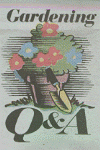

|
All About Gardening and Gardening Q & A by Pernell Gerver |
|
Bookmark
this page or add it to your favorites now! |
|
"Organic Weed Control for the Lawn and Garden" |
|
Weeds are the bane of gardeners everywhere. There’s a saying that purports that a weed is simply a plant out of place, but in reality weeds are more than just the wrong plant in the wrong place. Left unchecked, weeds can quickly take over the garden, lawn, and home landscape. Many weeds are very vigorous growers and can easily crowd out the desirable plants. Weeds compete for water, food, and sunlight and rob nearby plants of these precious resources. In addition, weeds make a garden, lawn, or home landscape look unsightly. Click on a product name below to order it from Pernell Gerver's Online Store. One of the most vigorous and difficult-to-control weeds is wild violet. This low-growing plant forms a large colony of plants because it spreads both by underground stems as well as by seeds. It bears violet or white flowers in spring that are followed by seed capsules that contain brown seeds. It’s a perennial weed that spreads quickly throughout the lawn and garden. It’s typically found in cool, moist, shady spots, but once it’s established, it can tolerate drought and sun. |
|
Creeping Charlie, which also goes by the name gill-over-the-ground and ground ivy, is probably the most despised lawn and garden weed there is. It’s a perennial, vining plant that creeps along the ground, forming a dense groundcover. The stems root wherever they touch the ground, making it difficult to control. It has small, rounded leaves all along its stems and bears violet-blue flowers from late April to June. The flowers are held on short flower stems that stand just above the foliage. Although creeping Charlie spreads primarily by creeping stems, it also produces seeds that help it spread about the lawn and garden. Its long, trailing stems can spread several feet long or more. Oxalis, also known as yellow woodsorrel, is a weed that commonly appears in flower beds in between the desirable plants. It’s a clover-like weed with leaves divided into three segments. It bears bright-yellow, star-shaped flowers from May to September. It quickly becomes invasive because of the way it reproduces. It spreads both by underground stems as well as by seeds. The seeds are held in brown capsules that literally explode when ripe, sending the seeds flying as far as 10 feet away from the mother plant. The seeds germinate shortly after they hit the ground, especially in the warm weather of summer. It’s usually an annual weed, but can survive in winters when the temperatures are not too severe. Japanese knotweed is probably the most invasive of any weed that can invade a garden or home landscape. It’s an aggressive, fast-growing, perennial weed that spreads mainly by underground stems. It can grow to six feet high and forms a dense mass of foliage that is almost shrub like. Its brownish-green, upright stems are segmented, similar to bamboo, and carry oval leaves. New shoots are red. It bears creamy-white, short flower spikes that stand upright on its stems in late summer. These flowers produce a small amount of seed that can help this noxious weed spread itself even further. Although it’s a perennial weed, its stems are very susceptible to frost and are usually killed to the ground with the first fall frost only to return the following spring from its roots. These and many other lawn and garden weeds can be controlled and eliminated with organic controls that are safe for people, pets, and the environment. For existing weeds in the lawn and garden, I use Herbicidal Soap Spray. This organic, fast-acting weed killer eliminates unwanted vegetation fast. It kills weeds, algae, and moss in the lawn and garden within hours. It kills the plant, roots and all. What's nice is that once the weeds are killed, they just shrivel up and disappear. To prevent weeds in flower beds and landscape plantings I use Corn Gluten Meal. This organic, weed-seed preventer is made from corn gluten meal, a byproduct of the corn syrup industry. It's a pre-emergent, preventing weeds from sprouting. It inhibits the growth of the seed's feeder roots, causing the seedling to die. For weed prevention in the lawn I use Organic Lawn Weed and Feed. It's a two-in-one product that prevents weeds and feeds the lawn all at the same time. The organic weed preventer it contains is a safe, natural lawn pre-emergent, preventing weed seeds from sprouting. Applied to established lawn, bare ground, or on top of mulch, it inhibits the growth of the weed seed's feeder roots, causing the weed seedling to die before you even see the weed. The organic lawn food it contains fertilizes the lawn. |

 by
Pernell Gerver
by
Pernell Gerver Pernell
Gerver, Horticultural Communication Services All rights reserved.
Pernell
Gerver, Horticultural Communication Services All rights reserved.